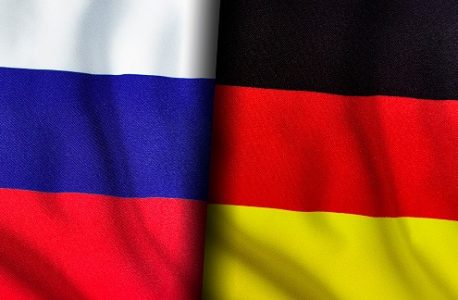By Ricardo Duchesne for the Council of European Canadians
Who/what is the biggest potential threat to the US? Islamic terrorism? No. China? No. Russia? No. The biggest threat is an alliance between German capital and Russian resources and manpower. For quite a few years, from the early 1990s to about 2015, and still to this day, many conservatives and dissidents have believed that Islam was/is the biggest threat to Western Civilization. If an Islamic terrorist act were to happen today, many would go back to this 9/11 way of thinking. It was a bonanza for ethnic Neocons galvanizing Western power to fight Iraq, Afghanistan, Libya, Syria…to fight this threat “at its source” while protecting Israel, the “real democratic canary in the coal mine”. Then Trump was elected, and Russia became the biggest threat. With the war in the Ukraine, and the Hunter Biden laptop, it all seems to make sense now. But we would be mistaken if we were to view Russia in isolation as the biggest potential threat. It is the possibility of a German-Russian alliance, that Germany may decide to break from its tutelage to American culture in preference of a geopolitical partner that promises to be far more lucrative and that could make possible a grand alliance across the largest landmass of the world, with Germany protecting its “historicist” heritage within an Eurasian traditionalist power zone.
The US is not a mere power that reacts to external threats. From the moment “America” became a major industrial power in the late 1800s, it has increasingly believed that it is not just another nation but a “redeemer nation” for the advancement of the principles of liberty, democracy, and universal brotherhood. This idea was reformulated in the early 1990s by Francis Fukuyama in the wake of the collapse of Soviet communism as follows: liberal democracy is not just a particular Western value but a political culture that expresses and meets the deepest desires of human beings to be recognized as equal in dignity, which equality under the law, the right to vote, freedom of religion, and liberal capitalist prosperity and comfort have successfully accomplished.
Communist nations failed to meet the most fundamental needs and desires of humans for material comfort and individual liberty. Capitalist democracies are inherently peaceful for their wealth is generated through mutually beneficial and amicable commercial exchanges and investments, not by conquering other nations, as was the case with pre-liberal traditional nations, and with the fascist regimes that were defeated in WWII. Liberal capitalist democracies are inherently progressive, and thus capable of integrating within their framework of liberal capitalist growth the criticisms and policy proposals of radical leftists and postmodernists looking for the extension of rights, environmental protections, and multicultural diversity.
After 9/11, Fukuyama’s argument came under a lot of criticism for failing to see that many people in the Islamic world seemed inclined to prefer their religious values over Western democracy and affluence. Western culture was not “the end of history”. Samuel Huntington’s counter thesis in The Class of Civilizations seemed more realistic: the very success of modernization in non-Western countries was encouraging ethnic confidence, traditionalism, and nationalism, rather than a longing for Westernization. This is all true. But not for an American nation that sees its democratic regeneration of the world as coeval with geopolitical power and massive accumulation of wealth. This “end of history” geopolitical power hinges on the dismantling of the largest, richest nation in natural resources, that is, Russia. The worth of Russia’s natural resources have been estimated to be about $75 trillion by Statista, which is about 40% higher than that of the US, which is ranked the second richest nation in resources.
It has been understood by American foreign policy analysts, including Fukuyama, that America will not be able to retain its post-Cold War supremacy unless it prevents “the emergence of a dominant and antagonistic Eurasian power”——— by encouraging Westernizers to take power in Russia, and supporting the full national independence of Ukraine, which is seen as geopolitical bridgehead for the projection of American and NATO Westernization. “A sovereign Ukraine”, as Zbigniew Brzezinski wrote in 1997 in The Grand Chessboard: American Primacy and Its Geostrategic Imperatives, is a “critically important component” of the ultimate victory of American democracy, for “without Ukraine, Russia ceases to be a Eurasian empire.” Russia will not be able to be, in the words of Alexander Dugin, “an independent pole of the multipolar world” capable of withstanding the spread of liberal democratic values and capitalist entertainment. This is known as the “Mackinder Heartland Theory,” which I discussed here a few months ago.
This is why Fukuyama has been a regular visitor to the Ukraine, not any Islamic nation, over the last decades, working with “democracy groups” to spread his “end of history” message. He has been publishing and commenting relentlessly on the Ukraine war since it began in February 2022. In an article for Journal of Democracy published in September 2022 he lays it all out:
If the Ukrainians don’t simply hold out against Russia but actually defeat Russia’s massive army and force it to retreat, the positive reverberations will be felt across the globe. Populist nationalists around the world, from Viktor Orbán to Matteo Salvini to Marine Le Pen to Donald Trump, have expressed admiration for Putin’s style of strongman rule. A Russian defeat and humiliation will puncture this narrative of the advantages of authoritarian government, and might lead to a rekindling of democratic self-confidence. It has been easy for publics in Western democracies to take for granted the peace and prosperity brought about by the liberal world order. It may be the case that every generation needs to relearn the lesson that the alternatives to liberal democracy lead to violence, repression, and ultimately economic failure. Such a lesson will be driven home if the world sees brave Ukrainians fighting for their country succeed beyond all expectations.
What most have missed is the fact that the US views Germany’s recently increasing economic alliance with Russia as the biggest threat to its grand geopolitical interests. Google “German investments in Russia“. German trade with Russia totaled €60 billion in 2021. “Over 3,600 German companies — from household product giant Henkel to automakers BMW and Mercedes — have set up shop in the country”. Research shows that “German direct investments are the most important source of advanced technologies and the methods of management promoting modernization of the Russian economy and transition to an innovative way of development”. These economic ties, since the end of the Soviet Union, reflect many centuries of German-Russian cultural relations, a high number of Germanic tsars and large German communities in Russia.
It is with this background in mind that I would like to draw attention to a talk that George Friedman, STRATFOR chairman and US security and intelligence advisor, gave a few years ago (at the Chicago Council on Foreign Affairs), arguing that the biggest threat to the US is a coalition between Germany and Russia, because the combination of German capital and technology with Russian natural resources and manpower is the only one that can counter US dominance. Here’s the talk in YT. You can find an excerpt of what he says about Germany-Russia at Bitchute.
This talk was discussed by Christina Lin, a Fellow at the Center for Transatlantic Relations at Johns Hopkins, in an article entitled “US war hawks’ Eurasia goal: Prevent Russo-German coalition, China’s OBOR project“. She paraphrases Friedman’s argument that the best US policy in central Eurasia is “divide et impera”, similar to what Reagan did by funding both sides in the Iran-Iraq war so they fight each other and not the US. The immorality of arming the same side so they kill each other, says Friedman; what matters is whether it benefits American interests; better they fight and kill each other than they oppose American geopolitical interests.
Lin does not draw the obvious conclusion that the US wants Russia to fight with Ukraine, force Germany to oppose Russia, and break up the developing connection between German capital and Russian resources. This explains why the Nord Stream was destroyed, a network of offshore natural gas pipelines which run under the Baltic Sea from Russia to Germany. The US is determined not to allow Germany to have close ties with Russia. Germans must be obedient to America’s interests. Germany must send tanks to Ukraine and fight Russia for the “Ukraine”.
Friedman distinctly says that the ultimate goal is “to keep the Russians out, the US in, and the Germans down” —— and that the US is focused on establishing a “cordon sanitaire” or buffer zone from the Baltics to the Black Sea in Central and Eastern Europe IN ORDER TO SEPARATE GERMANY FROM RUSSIA. It is not simply the amount of economic ties developing between the two countries in recent years, but, as noted in this article, that a strong German “presence in Russia might one day open the possibility of creating direct links from there to China, turning fantasies of a seamless Eurasian economic space into a reality.” In other words, Germany was potentially standing in the way of the American goal to dismantle Russia as an Eurasian multipolar world that counters liberal unipolar supremacy.
American Neocons know that most Dissidents are confused about the relationship between Germany and Russia, with many stuck in WWII, thinking we are still in a battle between national socialism and communism, or that Russia is controlled by Jews or Bolsheviks, or that the Ukraine is about “ethnic nationalism”. Neocons love wrapping the heads of innocent dissidents into knots of confusion and division. To me an alliance between Germany and Russia makes sense given the proximity of these two nations, their long historical ties, and, as Friedman says, the reality of German capital and knowhow and Russia’s massive natural resources.
BEYOND THIS, we must keep in mind that Germany was the only powerful European nation that proposed a different path to modernity, as articulated most forcefully by German Historicism, a path in reaction to the Enlightenment/Liberal path with its pretensions to be the true “progressive” and “rational” path. German nationalism and geopolitical power in the mid-19C coincided with modernization. The difference is that the Germans wanted a path that would be balanced with its unique history, its continued respect for aristocratic authority, together with a propertied and cultured middle class, working in unison with a powerful state acting as the common point of the Germans, with the highest capacity for independence and strength among the competing powers of the world, rather than a state acting at the behest of a dominant capitalist class pursuing its own interests, or at the behest of a democratic mob easily controlled by private companies. German historicists understood that to be somebody a people must have a strong state that is independent of other states. At the same time, Germans during this period enjoyed considerable individual liberties, universities open to merit, a constitutional monarchy, rule by established procedure, a high degree of economic freedom, and a truly dynamic cultural atmosphere which encouraged the full development of individuality in culture. German historicists believed in a society in which the individual was free while being simultaneously integrated into the German nation. They did not want a contractual society consisting of atomistic individuals pursuing their private happiness in a state of alienation from the historical heritage of Germany. In short, the Germans rejected the argument that liberalism reflected the deepest aspirations of man. They believed that a man’s dignity, and their sense of finding meaning and purpose in life, is more important than pursuing happiness and comfort as private selves, and that this dignity can only be validated within the natural communities of the family, the tribe, and the Volk — and also within a “communities of ideals” based on their unique language, arts, sciences, and religion.

